Honorable
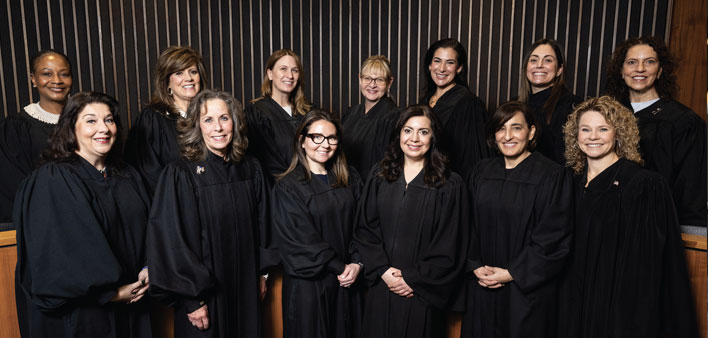
By Nick Lico / Photography by Mike Ferdinande
In 1789, Congress created the Supreme Court of the United States. It featured six judges, all males. It took 192 years for the first woman (Sandra Day O’Connor in 1981) to break that barrier. Today, four of the nine Justices, 44 percent, are women. We’re seeing similar trends in Michigan and Macomb County as more women are presiding on the bench. In Macomb County we have 17 women judges and Macomb Now was able to gather 13 of them into Judge Gatti’s courtroom for a quick group photo op. In just 15 minutes we could see the bonds between the women, the respect they have for one another and the true support that they give to each other. We were lucky enough to get five of those judges to share what got them to the bench and how much they love what they do.
Let’s Meet Them
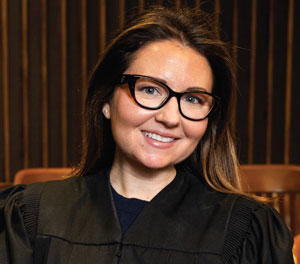 “I was always interested in the law profession; I just didn’t know in what capacity,” said Judge Annemarie Lepore, 41-A District Court. Among her accomplishments is the creation of a Sobriety Court.
“I was always interested in the law profession; I just didn’t know in what capacity,” said Judge Annemarie Lepore, 41-A District Court. Among her accomplishments is the creation of a Sobriety Court.
“We had to overcome a number of hurdles to create the Sobriety Court but the effort was well worth it. We graduated the first participant in January 2024. It has been one of my greatest rewards,” she said.
In describing her current position, she replied, “I really love District Court because you have a unique opportunity to help some individuals before they commit more serious crimes.”
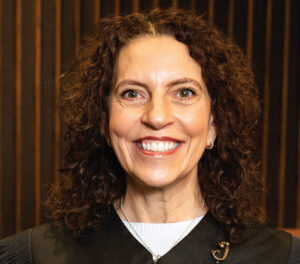 Judge Julie Gatti decided to pursue a law career while an undergrad at Michigan State University. “I took a philosophy class, which was part of a pre-law course, and decided I liked it a lot,” she said.
Judge Julie Gatti decided to pursue a law career while an undergrad at Michigan State University. “I took a philosophy class, which was part of a pre-law course, and decided I liked it a lot,” she said.
She was elected to the 16th Judicial Circuit Court in November 2018. It wasn’t a position she had originally aspired to but finds it extremely rewarding. “A young man who I sentenced under the Holmes Youthful Trainee Act a few years ago called my secretary to ask if there was an opportunity for him to mentor other young men. He thanked me for sentencing him. When one of them turns his life around, that is the most favorite aspect of my job,” Gatti said.
As one would imagine, being a judge can be challenging, especially for those on the Judicial Circuit Court, which handles felony cases and civil cases where the amount in controversy is over $25,000.
“One of the biggest challenges of my job is listening to a victim’s impact statement and hearing how someone’s crime has affected the victim. It’s difficult, traumatic and gut wrenching. I have to weigh the statement against whether the person can be rehabilitated to ensure that the penalty I assess is fair,” she said.
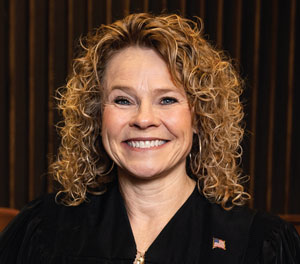 For her 19th birthday, Carrie Fuca’s mom sent her a cake with the inscription, “Happy Birthday, Judge Carrie.” While the wish may have been a bit premature, it did reflect her desire to one day become judge.
For her 19th birthday, Carrie Fuca’s mom sent her a cake with the inscription, “Happy Birthday, Judge Carrie.” While the wish may have been a bit premature, it did reflect her desire to one day become judge.
“I always wanted to be a judge because I saw it as a way to help people, “ the 41-B District Court judge said. Elected to her current position back in 2010, Fuca founded a Veterans’ Treatment Court the following year. She says the results have been heartwarming.
“Presiding over the treatment courts is extremely challenging but very rewarding, especially seeing them years later and having them thank you for transforming their lives. I had a mom tell me that she wouldn’t have had her son back were it not for the Veterans’ Treatment Court,” Fuca said.
Among the more challenging decisions she faces are whether to send the accused to jail or give them a break. “My goal is not to make them worse. I can’t tell you the number of times I have sent someone to jail and they thank me,” she explained.
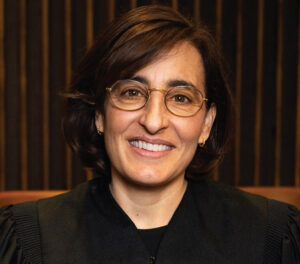 Judge Kathy Viviano, 16th Judicial Circuit Court, followed other family members, father and brother, into the legal profession. “I think I was interested in becoming a lawyer in high school. I like the profession, love being part of our system of justice,” Viviano said.
Judge Kathy Viviano, 16th Judicial Circuit Court, followed other family members, father and brother, into the legal profession. “I think I was interested in becoming a lawyer in high school. I like the profession, love being part of our system of justice,” Viviano said.
Because stakes are higher in the Circuit Court, so are the challenges. “Whether criminal or civil cases, you’re dealing with a lot of emotions. Our job is to help people understand and navigate through the process,” she said.
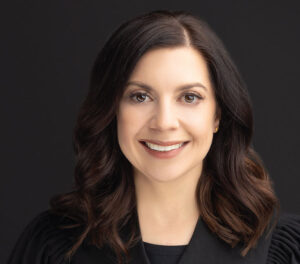 Judge Alyia Hakim’s background is in psychology. “I have always been interested in figuring out what makes us do what we do and how we can effectuate change within the law so we don’t have as many people cycling through the law,” the 39th District Court judge said.
Judge Alyia Hakim’s background is in psychology. “I have always been interested in figuring out what makes us do what we do and how we can effectuate change within the law so we don’t have as many people cycling through the law,” the 39th District Court judge said.
Hakim started her legal career as a criminal defense attorney and realized that a lot of her clients made one wrong decision based on their life situation. She saw becoming a judge as a way to better help those people and one way to do that is through her Sobriety Court.
“It starts off as one of the darkest days in the defendant’s life and it’s really rewarding to see someone go through the program and come out on the other side a changed person,” she said.
Inspiring More Women
With the number of women judges increasing significantly in the last ten years, do our judges believe they and other female judges are inspiring other women into law careers?
“I hope so. I think that the more women judges they see, the more they will want to pursue their own career in the legal profession.” Hakim replied.
“Yes, women can be an inspiration for women, especially since sometimes we share similar experiences. In the end, however, I’m hoping I’m inspiring everyone,” Viviano added.
“One of my favorite things as a lawyer was to mentor other women. Nothing makes me happier than to see young women come into this career and make a name for themselves,” Gatti said.
“We’re seeing more women coming up as judges because I think they feel that if we reached this status, so can they,” Fuca said.
The consensus is unanimous. And, there are more women judges living in Macomb County who represent other courts along with the many women in the field of law not mentioned in this article. So it seems being a woman judge and leader here in Macomb brings challenges with true rewards.

